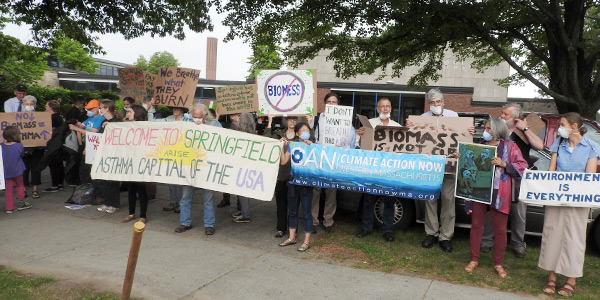By Michael Kuser
SPRINGFIELD, Mass. — More than 100 people turned out Wednesday evening at John J. Duggan Academy to protest a Department of Energy Resources proposal to alter the state’s renewable portfolio standard to include biomass plants.

About a hundred people outside a DOER hearing in Springfield on June 5 protest proposed RPS revisions. | © RTO Insider
“We want to give everybody an opportunity to be heard in an equal and fair way, and it’s really our opportunity to listen to your feedback on the proposed changes we have made to the regulations,” said Mike Judge, DOER renewable energy division director.
The state’s RPS requires all electricity retailers in the commonwealth to obtain minimum percentages of their supply from renewable resources, starting at 16% last year and increasing 2% annually to 80% in 2050.
The DOER in April filed draft changes to the RPS that would allow facilities burning non-forest derived woody biomass to receive grants for up to 80% of construction and installation costs and still receive ratepayer subsidies for energy generated, increasing the likelihood of biomass generators being built.
Nearly 300 people attended the fourth and final public hearing on the topic hosted by the department June 4. Among the nearly 60 people testifying were a dozen biomass industry proponents and five members of the Springfield City Council opposing plans by Palmer Renewable Energy for a 35-MW wood-burning plant in East Springfield.

Melvin Edwards | © RTO Insider
City Councilor Melvin Edwards, who testified that he is in line for a double lung transplant, told RTO Insider that, “The first day that this plant runs will be the first day and the only day that it would run its cleanest, regardless of the standards as they change. It will never be a benefit for my community except for the few jobs it will create, and allow me to suggest that the majority of the jobs … will be at the respiratory department of Baystate Medical Center.”
Edwards said that “we don’t want to make this about any one project.”
Different Voices

Licensed forester John Clarke testified in favor of the RPS changes.
“I practice sustainable forestry in my daily business and know that there’s opportunity for sustainably derived wood chips to provide local, renewable fuels for thermal, electric and co-generation facilities,” Clarke said. “These fuels are renewable and will directly replace fossil fuels, leaving ancient carbon in the ground and utilizing biogenic carbon for our energy needs.”

Springfield City Councilor Jesse Lederman addresses the DOER panel on June 5 in front of about 300 people. | © RTO Insider
City Councilor Jesse Lederman drew a standing ovation from about two-thirds of the crowd when he opposed the RPS changes as providing subsidies “to large-scale wood-burning incinerators in Massachusetts and the region.”
“I particularly draw your attention to the 2010 Manomet [Biomass Sustainability and Carbon Policy] study, which was commissioned by the state … and clearly found that these types of large-scale, low-efficiency incinerators were not carbon-neutral and could accurately be compared to the emissions of a coal power plant,” said Lederman, who is chair of the council’s committees on sustainability and the environment and health and human services.
Lederman said he and his colleagues would ask the legislature to remove biomass completely from the RPS statutes and also requested that the DOER extend the deadline for written comments to June 30. On Friday, the department pushed the deadline to July 26.
Charlie Bagnall of Peterson Pacific, a manufacturer of wood processing machinery, said he favored accommodating non-forest derived wood fuels such as the byproducts of vegetation management by utilities and from other sources. His company tries “to be as green as possible,” he said, telling how it implemented Tier 4 diesel emissions standards in 2012, six years before they went into effect in Massachusetts.

Tanisha Arena | © RTO Insider
Jake Dubreuil, sales manager of Barry Equipment in the town of Webster, testified that “1 million tons of non-forest derived fuel sources are produced annually — 1 million — in Massachusetts alone. … With the proposed changes to the RPS, responsible solutions … can be monitored by our state regulatory commissions and committees, ultimately displacing the use of fossil fuels.”
Tanisha Arena, executive director of local activist group Arise for Social Justice, testified that, “Biomass isn’t clean energy. Burning anything isn’t clean energy.
“If you betray Springfield with a biomass plant, Palmer Renewable Energy gets $10 million to $12 million a year in renewable energy subsidies, but we, the residents of Springfield, receive what? Will you compensate us for the nasty air we will breathe?”



